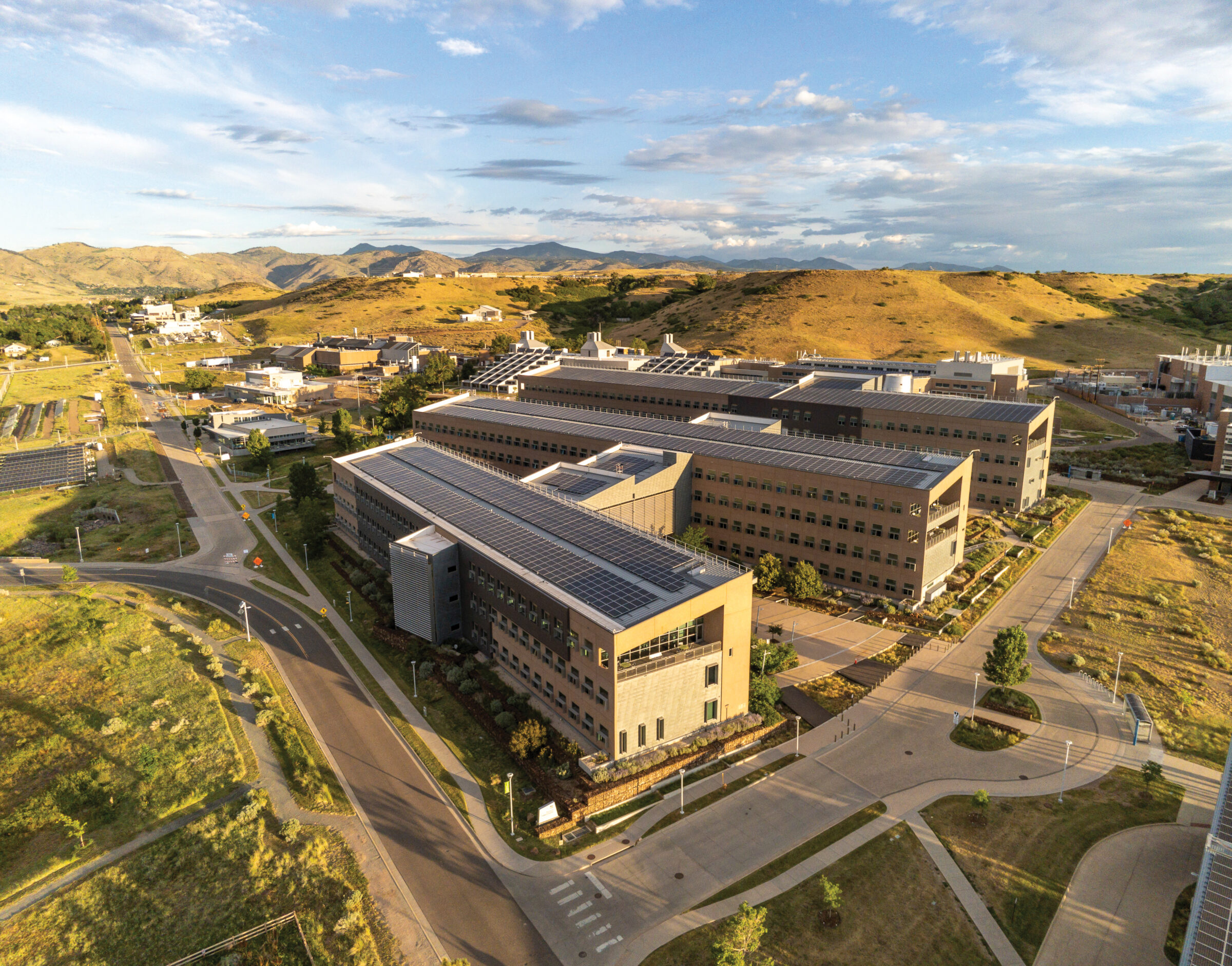Colorado is on a roll when it comes to renewable energy.
Boasting more than 300 sunny days a year, Colorado is the 6th-sunniest state in the nation, so it’s not surprising that it’s also among the top 10 states for solar power generated per capita. But it takes more than basking in warm rays to earn that ranking. It takes committed leadership with strong goals to drastically reduce greenhouse gas emissions and improve the state’s air quality.
Colorado is already an established leader in clean energy. Renewables represent 18% of the state’s net generation, and the state is No. 7 in the U.S. for wind power generation capacity installed.
Some 6,000 energy companies employ 149,000+ employees with $11.4 billion in annual payroll in the state.
When the state’s legislature convened in 2022, it came away with tightened policies and ambitious programs to drastically reduce greenhouse gas emissions and improve air quality. Colorado’s investments include:
- $65 million for electric school buses;
- $47 million for air quality monitoring and enforcement;
- $25 million for industrial clean air and decarbonization grants;
- $12 million for eBike rebates and programs;
- $20 million for building electrification;
- $20 million for green rebuilding after disasters;
- $12 million for geothermal energy;
- $28 million for free transit fares statewide during ozone season;
- $7 million for aerial monitoring of oil and gas and other industrial emissions sources, and
- $30 million for expanded bus rapid transit along the I-25 and I-70 corridor expansions.
A comprehensive statewide roadmap outlines plans to reduce pollution from the oil and gas industry by at least 60%. In addition, the six utilities that operate 99% of the fossil power plants in Colorado are dedicated to reducing emissions by at least 80% by 2030. With both state and local community regulations in place, the state is poised to clean up its act from the top down.

“We simply must end our reliance on costly fossil fuels, improve energy security and save people money.”
— Colorado Gov. Jared Polis, January 17, 2023, in his State of the State address
The commitment to a sustainable energy future is supported by recent strong legislation, and the state’s new clean energy goals are serving to inspire Colorado companies to explore innovative solutions that involve advanced technologies, often with support from government incentives.
Shared Belief
Companies can take advantage of two performance-based, discretionary incentive vehicles — a strategic job growth incentive and a business income tax credit. Local communities statewide have a shared belief in the importance of cheaper, sustainable energy alternatives, and frequently partner with regional and state-wide agencies to encourage growth in the sector.
Mike Landes, senior business development manager for Colorado’s Office of Economic Development & International Trade (OEDIT), says, “There is a holistic quality to sustainability that extends to communities across the state, whether rural or urban, and Colorado has incorporated that attitude in our support of our energy industry as well.”
Besides incentives, Colorado has one of the top workforces in the nation and a huge portfolio of growing companies that enjoy a fully collaborative ecosystem. Says Landes, “Many private companies move here because of the collaborative efforts with the major research labs within our state’s universities. The concentration of talent that is generated from all the energy-related R&D conducted here is quite valuable to the private sector and very supportive.”
Australia-based Fortescue Future Industries (FFI), a leader in green energy technology, recently announced plans to establish a technology hub, convening experts from leading Colorado universities and institutions, including the U.S. Department of Energy’s National Renewable Energy Laboratory (NREL) based in Golden, Colorado.
While FFI will specifically focus on de-carbonizing hard-to-abate industries that can be rapidly commercialized, the technology hub will connect scientists and engineers worldwide in an effort to advance cutting-edge innovations in clean energy across diverse manufacturers.
Colorado awarded $1.996 million in incentives to support the establishment of the hub and the creation of jobs in the green energy industry.
In announcing the project in September 2022, FFI said it expects to invest $80 million over 10 years in research projects with NREL. The collaboration has the potential to create more than 350 high quality research, engineering, and management jobs.
“Combined with the impact of the Inflation Reduction Act (IRA),” the company said, “this investment is expected to catalyze a strong increase in manufacturing in the green industrial ecosystem, which much be established if the world is to change to a zero-pollution future.”
Colorado is on the path to 100% renewable energy by 2040.
Source: OEDIT
FFI also has plans to establish further collaborative research relationships with the Colorado School of Mines, University of Colorado, Colorado State University and other U.S. research labs and universities.
“The NREL team is eager to get to work with FFI and our collaborators and partners across the Colorado hydrogen ecosystem,” said NREL Laboratory Director Martin Keller.
When Crusoe Energy Systems LLC announced plans to expand its Denver headquarters, Governor Jared Polis praised the energy and technology innovator for creating nearly 300 new high-paying jobs and for its pioneering emission-reduction solutions.
“Companies like Crusoe Energy,” said Polis, “represent the forward-thinking environmental innovation that will help Colorado achieve our ambitious energy transition and economic goals.” Crusoe’s technology captures environmentally harmful emissions from oil and gas extraction, and converts byproducts into electricity for use in modular, mobile data centers.
In June 2022, Crusoe Energy acquired Denver-based Easter-Owens Electric Company, a modular data center and specialized electrical systems manufacturers.
The governor’s commitment to clean energy was recently affirmed in his State of the State address on January 17, 2023, when he said, “We simply must end our reliance on costly fossil fuels, improve energy security and save people money.”
Colorado is on the path to 100% renewable energy by 2040, with both current and new programs underway designed to help reach that target. The Governor is proposing $120 million in annual clean energy tax credits; funding for Colorado Mesa University to expand campus-wide geothermal systems; and leading a multi-state consortium with Utah, Wyoming, and New Mexico to gain additional federal investment as a hydrogen hub.
